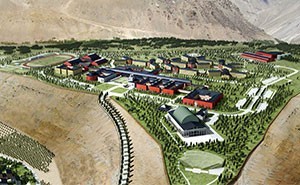Every year, the Aspen Network of Development Entrepreneurs (ANDE) holds a conference focused on addressing the challenges of measuring and reporting the impact of investments in small and growing businesses in the developing world. In my role as an Impact Investing Fellow at Aga Khan Foundation (AKF), I was fortunate to attend this year’s conference representing the Foundation’s Impact Investing team.
The conference provided a great opportunity to participate in a variety of discussions on social entrepreneurship, impact-driven investing and the future of the development sector in general. In addition to these truly thought-provoking conversations, it also provided a timely opportunity to step away from my day-to-day work and reflect on my time as a Fellow. Here are a few of the more important lessons I have learned at the Foundation:
International development is heading in a new direction
It is widely understood that development aid is insufficient for alleviating poverty around the world.
With a degree in International Relations and concentrations in economic and African development from the University of Southern California, I learned about this “funding gap” time and time again in my undergraduate courses. What I heard less frequently, and what eventually led me to pursue a career in development, were possible solutions to address such critical issues in the developing world.
Through my work in Impact Investing at AKF in Washington DC, I now appreciate that market-based solutions have the potential to fill the gap left by traditional aid in truly innovative and sustainable ways. The need for “convener” organizations such as ANDE and the Global Impact Investing Network exemplify how the international development field is continuously evolving. Members of these organizations, which include private corporations, government entities, private foundations, individual entrepreneurs, and others, are at the forefront of the changing landscape in development.
Impact investing is not a new industry for the AKDN, but a growing one

A drawing of the future Khorog campus at University of Central Asia. The Overseas Private Investment Corporation (OPIC) has committed financing for the construction of the first phase of the project.
After a few weeks at AKF and several orientation presentations, it became clear to me that impact investing isn’t anything new for the Aga Khan Development Network (AKDN). In truth, the AKDN was ahead of its time in making investment a core tenet of its development model. The Network has been investing in communities across the globe for over five decades, from building high-quality educational institutions in Kenya to investing in hydropower energy facilities in Central Asia. The Impact Investing program at AKF, which began in 2012, is an extension of that pioneering work by AKDN. Through this program, AKF can make substantial mission-related investments (MRIs), providing investment capital to organizations and entrepreneurs that advance the Foundation’s mission of ending poverty, while also attracting investment capital from U.S.-based partners such as the Overseas Private Investment Corporation (OPIC) and other like-minded investors for social enterprises within the AKDN.
Impact investing can be for everyone
Like much of the AKDN’s work, the AKF Fellowship Program is unique. The two-year program provides an opportunity for early-career professionals to gain exposure to international development work in the U.S. and abroad. It’s funny, but before starting my fellowship I was hardly concerned about the logistics of spending a year in a developing country. Instead, as a recent university graduate with no background in business, finance or social entrepreneurship, I was more intimidated by the first part of the fellowship: working in impact investing. Eleven months later, I am still not an expert in business or finance but I have learned that the impact investing field requires a variety of skills. Even without a business background, I have been able to contribute to deals in AKF’s MRI portfolio by providing thorough research and analytical support. For example, I spent a large part of my time developing a system for tracking the social impact of the Foundation’s current and future investments. Attending the ANDE metrics conference was a key part of my work on metrics measurement, and allowed me to better understand best practices regarding impact measurement and management.
This September, I will join AKF West Africa in Bamako, Mali and Abidjan, Cote d’Ivoire to complete the second year of my fellowship. While I will be joining the West Africa team in a different capacity as a Grants Management Fellow, I think the lessons I have learned from Impact Investing will influence my work in a lot of ways. In addition to supporting proposal development and assisting with grant reporting and monitoring, I hope to engage with AKFED, the AKDN’s economic development arm, to learn more about the growing investment space in West Africa. The past year has shown me that impact investing can inform what we do in all development contexts.
Pictured Above: Aga Khan Foundation’s impact investing program has attracted investments from U.S.-based partners such as the Overseas Private Investment Corporation (OPIC) for social enterprises like the Aga Khan University’s hospital expansion.
By Angel Njenga, former Impact Investing Fellow for Aga Khan Foundation U.S.A. and now Grants Management Fellow with Aga Khan Foundation in West Africa